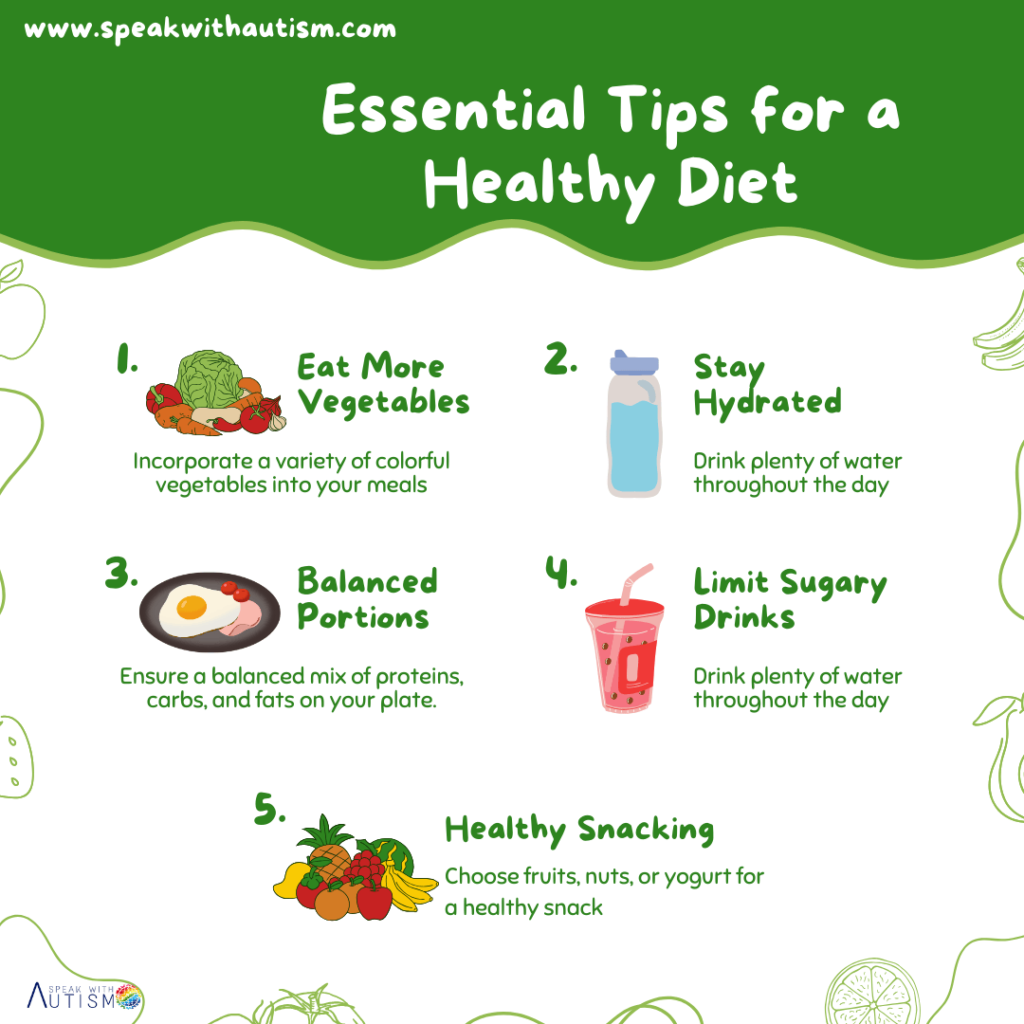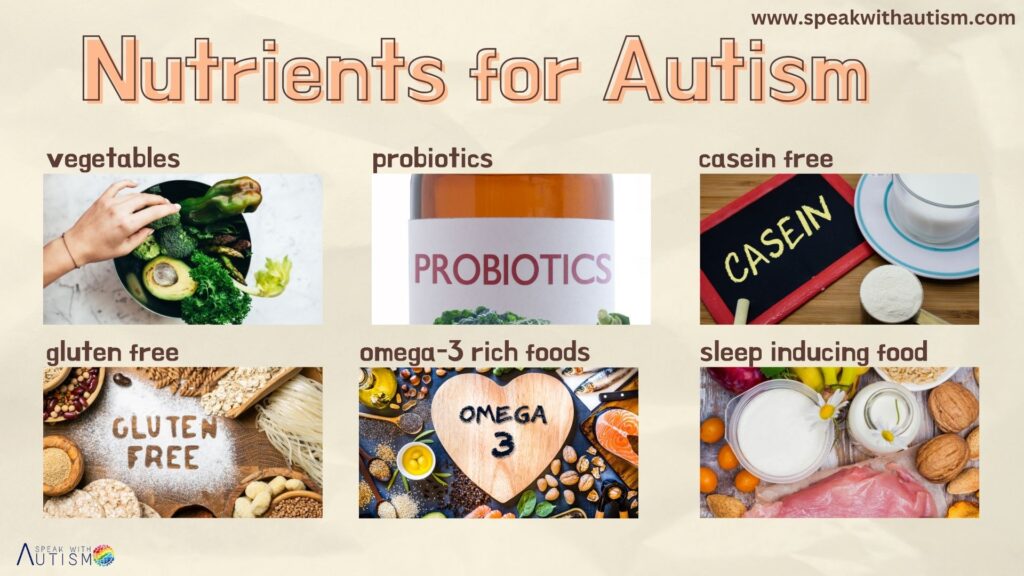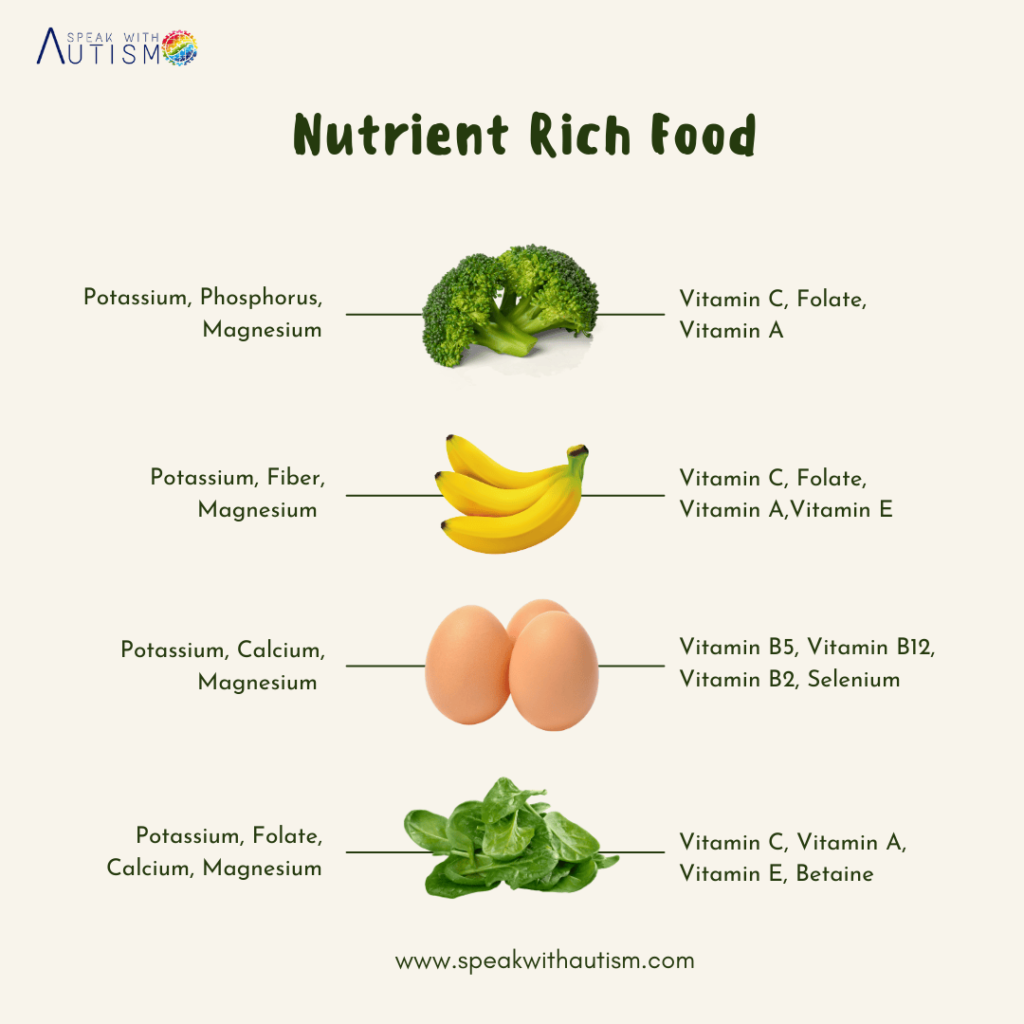In this blog, we will explore 10 Essential Nutrients in Autism Care. Autism spectrum disorder is a neurological condition that affects the behavior and communication skills of children. To manage autism, doctors often recommend therapies (occupational therapy, Analysis behavior therapy, sensory integration therapy, speech therapy) along with FDA-approved and off-label medications. However, improvements can also be achieved by focusing on nutrition and diet. According to some parents, significant positive changes have been observed in their children by adopting specific dietary strategies.
Table of Contents
Importance of Nutrients in Autism
Nutritional interventions like the GFCF diet (Gluten-Free, Casein-Free diet), fish oil, probiotics, and prebiotics are said to help reduce negative behaviors. Let’s explore the best nutrition and diet practices for autism management.

1. Avoiding Refined Sugar
Refined sugar can increase hyperactivity and reduce concentration, making it difficult for children to focus. The first dietary change recommended for autism is to eliminate sugar. Many parents opt for natural alternatives like jaggery or jaggery powder, which can be added to milk or desserts. The advantage of jaggery is that it provides energy without inducing hyperactivity.
2. GFCF Diet (Gluten-Free and Casein-Free Diet)
Many autistic children are sensitive or allergic to gluten and casein, which can negatively impact the gut-brain connection.
- Gluten-Free Diet: Foods made from refined flour and semolina are avoided, and alternatives like millet and sorghum are used.
- Casein-Free Diet: Milk and dairy products are removed, and substitutes like almond milk or coconut milk are included.
This diet helps improve gut health, leading to better focus and positive behavior in children.
3. Probiotics and Prebiotics
According to research, gut health is deeply connected to autism. Improving gut health can positively impact children’s behavior and mood.
- Probiotics: Examples include Garden of Life supplements, kimchi, and kombucha.
- Prebiotics: Foods like bananas, apples, and oats are rich in prebiotics.
These improve gut bacteria, enhance digestion, and strengthen the immune system. They also help manage gastric issues like constipation, diarrhea, and abdominal pain in autistic children.
4. Fatty Acids and Fish Oil
Omega-3 fatty acids and fish oil are essential for brain development in children. However, these should only be used under a doctor’s guidance to ensure the correct dosage. Benefits include:
- Improved speech clarity
-Reduced hyperactivity
-Enhanced brain function and memory
5. Using Extra Virgin Olive Oil
Extra virgin olive oil is a great source of healthy fats essential for overall development. It can be used in cooking or given directly (1-2 teaspoons) as prescribed by the dietician.
6. Balanced Nutrition
A balanced diet is vital for autistic children. Create a meal plan that includes:
- Green vegetables (e.g., broccoli, beetroot)
- Lentils
- Gluten-free grains
- Fresh fruits (e.g., blueberries, oranges)
Avoid processed foods, artificial flavors, and preservatives. Proper nutrition helps maintain energy levels and boosts cognitive abilities.

7. Proper Hydration
Keeping children hydrated is essential for their overall health. Encourage them to drink plenty of water and sugar-free fruit juices.
8. Melatonin-Rich Foods
Sleep issues are very common for special children, such as those with autism, ADHD, cerebral palsy, etc., to experience sleep issues. Adding specific foods to their diet can help regulate their sleep cycle effectively. Especially in autistic children, difficulties in sleeping through the night or waking up in the middle of the night are quite common. This happens because sleep disorders are often linked to autism. Foods rich in melatonin, such as bananas, almonds, and walnuts, can help improve sleep quality.
9. Personalized Nutrition Plan
Each child is unique, so it is crucial to create a personalized diet plan based on their preferences, sensitivities, and needs. Consult a dietitian or doctor before making any significant dietary changes to ensure the plan is effective and balanced.
10. Importance of Minerals and Supplements

Adequate vitamins and minerals are critical for the growth and brain development of autistic children. Key nutrients include:
- Vitamin B6 and B12: Support brain function and energy production.
- Vitamin D: Strengthens bones and boosts immunity.
- Iron and Zinc: Enhance neurological functions and improve focus.
- Folic Acid and Magnesium: Stabilize mood and promote gut health.
These minerals can be provided through a balanced diet or doctor-prescribed supplements. Always consult a healthcare professional before introducing supplements to ensure the child receives the appropriate dosage.
Conclusion
In conclusion, treating autism demands a holistic approach in which diet plays a crucial role. With the right nutritional plan and patience, you can see positive changes in your child’s health and development. However, some parents worry about dietary deficiencies while following the GFCF (gluten-free, casein-free) diet. Therefore, before introducing any nutrition or changing your child’s diet, it is essential to consult a Neurologist pediatrician, and dietician. They can create a perfect diet plan tailored to your child’s needs.
The use of certain minerals like Vitamin B6, B12, Vitamin D, Vitamin C, iron, folic acid, magnesium, etc., is often based on tests to determine the child’s nutritional deficiencies. However, if your child is not a picky eater, these nutritional supplements are generally not recommended by doctors.
Frequently Asked Questions (FAQ)
Can gut health cause autism?
There can be a connection between gut health and autism, but gut health cannot be considered the direct cause of autism. Autism is a neurological condition caused by genetic and environmental factors. It has been observed that autistic children may have an imbalance of gut bacteria, which can affect their behavior and mood. Through the gut-brain axis, the gut and brain are connected. Symptoms of autism have been improved in some cases through a GFCF (gluten-free, casein-free ) diet or by enhancing gut health. Improving gut health has been proven helpful in managing certain symptoms of autism, but it cannot be considered the primary cause of autism. If your child has digestive or gut health issues, you should consult a doctor.
What is GF-CF diet?
The GF-CF diet stands for the Gluten-Free, Casein-Free diet. It is a dietary approach used to manage symptoms in autism. Gluten is a protein found in grains like wheat, barley, and rye. It is avoided because some children have gluten sensitivity or allergies, which negatively impact their behavior. Due to this sensitivity, autistic children often face gut health issues.
Casein-Free Diet refers to avoiding casein, a protein found in milk and dairy products. Casein is avoided because some autistic children are sensitive to it, which worsens their digestive issues and behavior.
What are the benefits of a gluten-free, casein-free (GF CF) diet?
Positive changes have been observed with the use of the GF-CF diet. For children who are sensitive to gluten and casein, this diet has shown the following benefits:
1. Improves gut health by reducing inflammation and digestive discomfort.
2. Enhances focus and reduces hyperactivity.
3. Positively impacts mood and behavior.
4. Helps balance the gut-brain connection, which further plays a role in autism symptoms.
